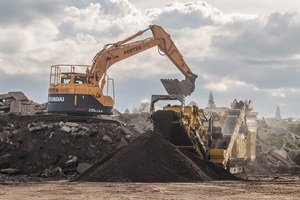Council climate change initiative takes concrete steps with waste
Published on 19 November 2021

Whanganui District Council has been working with its Roading Alliance partner Downer on a climate change initiative to reduce and reuse waste concrete.
Downer maintains the roading and pedestrian network in urban Whanganui and the wider district. A considerable amount of concrete and asphalt waste material is produced when repairs and improvements are made to the network.
The council’s senior roading engineer, Brent Holmes, says, “To reduce disused roading material going to landfill, the Roading Alliance decided to trial using concrete waste as a product that could be used for unsealed road remetalling.”
The potential reuse of local concrete waste was seen as an alternative to using 100 percent new material sourced as greywacke from Kakariki in Rangitikei and limestone shellrock from Maxwell.
Brent Holmes says, “Together with Downer, we grew a stockpile of concrete waste to an economic size and a subcontractor was engaged to crush the concrete into a suitable grading aggregate. This material was then placed on sections of our district’s unsealed rural roading network to see how it performed.”
This initial trial work proved successful. Brent Holmes says two different metal products have now been developed from the crushed concrete for various purposes, including unsealed road remetalling and as a pre-pouring medium for the laying of concrete footpaths.
“We found these products are actually better in some situations than the materials we’ve traditionally used. The crushed concrete product also generates less dust than traditional materials, which is a real bonus to our rural communities in hot, dry conditions.”
Other benefits from the crushed concrete material include a cost saving over buying some more traditional aggregate products – scarcity of raw materials due to several national roading projects have recently driven these costs to extreme levels – as well as a significant reduction in cartage and dumping fees associated with roading waste.
Brent Holmes says, “Because we did this locally, the cost to cart material to parts of our unsealed network is now lower. Stockpiling this reusable concrete material in the alliance’s Balgownie yard, rather than taking it to landfill at Bonny Glen near Marton, is also a cost saving in terms of fuel and time, and a real reduction in the entire operation’s carbon footprint.”
To continue from the trial success, the Roading Alliance is now accepting some commercial concrete waste to grow the stockpile of reusable material faster. Other potentially suitable waste and by-product material is also being considered to add to the stockpile. This will have the advantage of further reducing costs as well as possibly improving the performance of the new crushed concrete product.
ABOVE IMAGE: Concrete waste is crushed for reuse at the Roading Alliance’s Balgownie yard